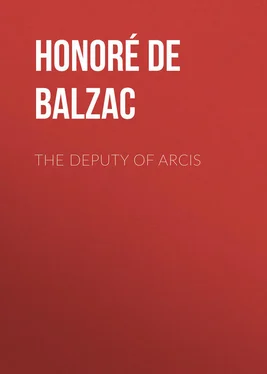Honoré Balzac - The Deputy of Arcis
Здесь есть возможность читать онлайн «Honoré Balzac - The Deputy of Arcis» — ознакомительный отрывок электронной книги совершенно бесплатно, а после прочтения отрывка купить полную версию. В некоторых случаях можно слушать аудио, скачать через торрент в формате fb2 и присутствует краткое содержание. Жанр: literature_19, foreign_antique, foreign_prose, на английском языке. Описание произведения, (предисловие) а так же отзывы посетителей доступны на портале библиотеки ЛибКат.
- Название:The Deputy of Arcis
- Автор:
- Жанр:
- Год:неизвестен
- ISBN:нет данных
- Рейтинг книги:3 / 5. Голосов: 1
-
Избранное:Добавить в избранное
- Отзывы:
-
Ваша оценка:
- 60
- 1
- 2
- 3
- 4
- 5
The Deputy of Arcis: краткое содержание, описание и аннотация
Предлагаем к чтению аннотацию, описание, краткое содержание или предисловие (зависит от того, что написал сам автор книги «The Deputy of Arcis»). Если вы не нашли необходимую информацию о книге — напишите в комментариях, мы постараемся отыскать её.
The Deputy of Arcis — читать онлайн ознакомительный отрывок
Ниже представлен текст книги, разбитый по страницам. Система сохранения места последней прочитанной страницы, позволяет с удобством читать онлайн бесплатно книгу «The Deputy of Arcis», без необходимости каждый раз заново искать на чём Вы остановились. Поставьте закладку, и сможете в любой момент перейти на страницу, на которой закончили чтение.
Интервал:
Закладка:
“That’s it,” said Beauvisage; “I am too sensible of this attention on the part of my fellow-citizens not to be excessively flattered by it.”
“Bravo!” cried the notary alone.
“The devil take me!” thought Beauvisage, “if I am ever caught haranguing again.”
“Will Messieurs Fromaget and Marcelin accept the functions of inspectors of the ballot?”
“It would be more regular,” said Achille Pigoult, rising, “if the meeting itself nominated those officers, – following, of course, the parliamentary forms of the Chamber.”
“That is best,” said the huge Monsieur Mollot, clerk of the court; “otherwise what is here taking place would be a mere farce; we should not be free in our action, in which case we might as well continue to do the will of Monsieur Simon Giguet.”
Simon said a few words to Beauvisage, who rose and delivered himself of a “Messieurs!” in palpitating tones.
“Pardon me, Monsieur le president,” said Achille Pigoult, “the chairman presides, he does not speak.”
“Messieurs,” continued Beauvisage, prompted by Simon, “if we are – to conform – to parliamentary usage – I shall beg – the honorable gentleman – Monsieur Pigoult – to address the meeting – from this table – here present – ”
Pigoult sprang to the table, stood beside it with his fingers resting lightly on its edge, and gave proof of his boldness by delivering the following speech without the slightest embarrassment, and somewhat after the manner of the illustrious Monsieur Thiers.
“Messieurs, it was not I who made that proposal for parliamentary usage; nevertheless I can conceive that an assemblage of some sixty notabilities of Champagne needs a chairman to guide it; for no flock can get on without a shepherd. If we had voted for secret balloting, I am certain that the name of our excellent mayor would have been returned unanimously. His opposition to the candidate put forward by his relations proves to us that he possesses civic courage in the highest degree, inasmuch as he has dared to free himself from the closest ties – those of family. Patriotism before family! that is indeed so great an effort that, to make it, we are forced to believe that Brutus from his realm of justice still contemplates us after the lapse of two thousand, five hundred and some years. It seemed natural to Maitre Giguet, who had the merit of divining our wishes in the choice of a chairman, to guide us still further in electing inspectors; but, if I am not mistaken, you think with me that once is enough – and you are right. Our mutual friend, Simon Giguet, who intends to offer himself as candidate, would have the air of assuming mastery, and he might, consequently, lose in our minds the good-will we should otherwise bestow upon a modest attitude like that of his venerable father. Now what is our worthy chairman doing at this moment by accepting the method of presiding suggested to him by the candidate? He is depriving us of our liberty! I ask you: is it proper that the chairman of our choice should tell us to nominate, by rising or sitting, inspectors of the ballot thus forced upon us? Have we any liberty of choice? If I were proposed, I believe all present would rise out of politeness; indeed, we should all feel bound to rise for one another, and I say there can be no choice where there is no freedom of action.”
“He is right,” said the sixty auditors.
“Therefore, let us each write two names on a ballot, and the two gentlemen who are elected will then feel themselves the real choice of this assembly; they will have the right, conjointly with our honorable chairman, to pronounce upon the majority when we come to a vote on the resolutions to be offered. We are here, I think, to promise to a candidate the fullest support that each can give at the coming primary meeting of all the electors of the arrondissement. This act is therefore, and I so declare it, a grave one. Does it not concern one four-hundredth part of the governing power, – as our excellent mayor has lately said with the ready wit that characterizes him and for which we have so high an appreciation?”
During these remarks Colonel Giguet was cutting a sheet of paper into strips, and Simon had sent for pens and ink.
This preliminary discussion on forms had already made Simon extremely uneasy, and had also aroused the attention of the sixty assembled bourgeois. Presently they began to write their ballots, and the wily Pigoult contrived to obtain a majority for Monsieur Mollot, the clerk of the court, and Monsieur Godivet, the registrar. These nominations were naturally very displeasing to Fromaget, the apothecary, and Marcelin the solicitor.
“You enable us,” said Achille Pigoult, “to manifest our independence. Therefore you may feel more pride in being rejected than you could have felt in being chosen.”
Everybody laughed.
Simon Giguet then produced silence by demanding speech of the chairman, whose shirt was already wet and became still wetter as he mustered all his courage to say: —
“Monsieur Simon Giguet has the floor.”
IV. THE FIRST PARLIAMENTARY TEMPEST
“Messieurs,” said Simon Giguet, “I ask permission to thank Monsieur Achille Pigoult, who, although our meeting is altogether friendly – ”
“It is a meeting preparatory to the great primary meeting,” said the solicitor Marcelin.
“That is what I was about to explain,” resumed Simon, “I thank Monsieur Achille Pigoult for having insisted on the strictness of parliamentary forms. This is the first time that the arrondissement of Arcis has been at liberty to use – ”
“At liberty!” said Pigoult, interrupting the orator.
“At liberty!” cried the assembly.
“At liberty,” continued Simon Giguet, “to use its rights in the great battle of a general election to the Chamber of Deputies; and as, in a few days, we shall have a meeting, at which all electors will be present, to judge of the merits of the candidates, we ought to feel ourselves most fortunate in becoming accustomed here, in this limited meeting, to the usages of great assemblies. We shall be all the more able to decide the political future of the town of Arcis; for the question now is to substitute a town’s interests for family interests, a whole region for a man.”
Simon then reviewed the history of the Arcis elections for the last twenty years. While approving the constant election of Francois Keller, he said the moment had now come to shake off the yoke of the house of Gondreville. Arcis ought to be no more a fief of the liberals than a fief of the Cinq-Cygnes. Advanced opinions were arising in France of which the Kellers were not the exponents. Charles Keller, having become a viscount, belonged to the court; he could have no independence, because, in presenting him as candidate, his family thought much more of making him succeed to his father’s peerage than of benefiting his constituency as deputy, etc., etc. And, finally, Simon presented himself to the choice of his fellow-citizens, pledging his word to sit on the same bench with the illustrious Odilon Barrot, and never to desert the glorious flag of Progress.
Progress ! one of those words behind which more flimsy ambitions than ideas were trying to group themselves; for, after 1830, it represented only the pretensions of a few hungry democrats. Nevertheless, this word had still a great effect upon Arcis, and gave stability to whosoever might inscribe it on his banner. To call himself a man of progress was to declare himself a philosopher in all things and a puritan in politics; it declared him in favor of railroads, mackintoshes, penitentiaries, wooden pavements, Negro freedom, savings-banks, seamless shoes, lighting by gas, asphalt pavements, universal suffrage, and reduction of the civil list. In short, it meant pronouncing himself against the treaties of 1815, against the Eldest Branch, against the colossus of the North, perfidious Albion, against all enterprises, good or bad, of the government. Thus we see that the word progress might signify “No,” as well as “Yes.” It was gilding put upon the word liberalism , a new pass-word for new ambitions.
Читать дальшеИнтервал:
Закладка:
Похожие книги на «The Deputy of Arcis»
Представляем Вашему вниманию похожие книги на «The Deputy of Arcis» списком для выбора. Мы отобрали схожую по названию и смыслу литературу в надежде предоставить читателям больше вариантов отыскать новые, интересные, ещё непрочитанные произведения.
Обсуждение, отзывы о книге «The Deputy of Arcis» и просто собственные мнения читателей. Оставьте ваши комментарии, напишите, что Вы думаете о произведении, его смысле или главных героях. Укажите что конкретно понравилось, а что нет, и почему Вы так считаете.












